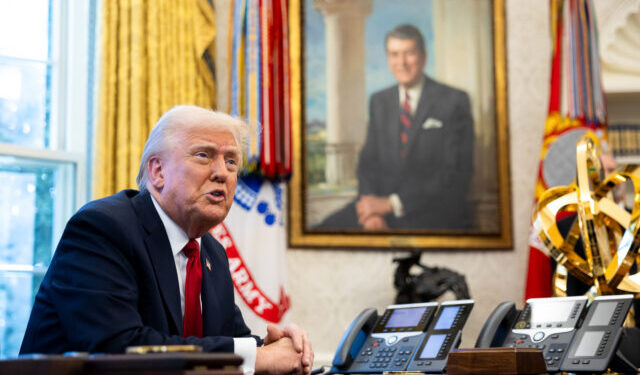In a bold move to revitalize American manufacturing and reduce dependence on foreign imports, President Donald Trump announced on Wednesday that his administration will impose a 25% tariff on all imported cars and trucks. This sweeping measure is designed to boost domestic production, create American jobs, and level the playing field for U.S. automakers.
The tariffs, set to take effect on April 2, will apply to all foreign-made vehicles, even if they are produced by American brands overseas. This means automakers who have moved their production abroad to take advantage of cheap labor and lower costs will now face a significant financial hit—unless they bring those jobs back home.
Trump’s America-First Policy in Action
Speaking from the Oval Office, Trump made it clear that this policy is all about putting American workers first.
“What we’re going to be doing is a 25 percent tariff on all cars not made in the U.S.,” the president stated. “Anybody who has plants in the United States, it’s going to be good for.”
The move aligns with Trump’s longstanding commitment to reshoring jobs, rebuilding the American auto industry, and ensuring the country isn’t reliant on foreign manufacturers—many of whom benefit from lopsided trade deals that put U.S. workers at a disadvantage.
Who Will Be Affected?
The tariffs will apply globally, meaning automakers from Europe, Asia, and even those in Canada and Mexico—nations with existing free trade agreements with the U.S.—could be affected.
While the administration has suggested that certain countries may receive exemptions, no clear guidelines have been released. Instead, Trump is using this as leverage to negotiate better trade deals and bring car manufacturing jobs back to America.
A ‘Very Exciting’ Opportunity for U.S. Industry
Trump framed the tariff announcement as a massive opportunity for businesses to reinvest in the United States rather than outsourcing jobs overseas.
“This is very exciting,” he said, emphasizing that companies with manufacturing plants in America will benefit significantly.
This move has been hailed by pro-America trade advocates who argue that foreign automakers have had unfair advantages for decades, making it harder for U.S. auto manufacturers to compete.
While some globalist economists claim that tariffs could lead to higher car prices, supporters of the move argue that this is a small price to pay for rebuilding the country’s industrial base and ensuring high-paying manufacturing jobs remain in the U.S.
Instead of relying on cheap foreign labor and unfair trade agreements, American workers will have a fighting chance to reclaim their dominance in the auto industry.
This latest move is just another bold step in Trump’s America-First agenda—an economic strategy that prioritizes American workers over globalist interests. With record-low unemployment and a booming stock market, the former president’s economic policies continue to resonate with hardworking Americans who want fair trade, not free trade that benefits everyone except the U.S.
Expect global auto manufacturers to push back hard, but as we’ve seen before, Trump plays to win—and this fight is about ensuring a stronger, more prosperous future for American workers and industries.
Stay tuned as this story develops!




















